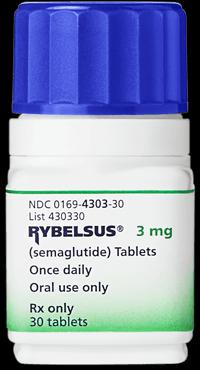Rybelsus is a popular oral medication used to treat people with type 2 diabetes mellitus. It is a relatively new medication that was approved by the FDA (Food and Drug Administration) in the U.S. in 2019, and it has already gained a lot of popularity. Rybelsus is a type of medication that helps to control high blood sugar levels in your body, but it can also cause some side effects. Some people may experience mild or serious side effects during their Rybelsus treatment and may want to know more about how to avoid them.
If you are one of the many people who are interested in Rybelsus, this is the post for you. We will discuss possible side effects of Rybelsus, as well as tips on how to prevent them. Before we do that let’s take a look at what Rybesus is and how it works.
What is Rybelsus?
Rybelsus is a brand-name prescription drug manufactured by Novo Nordisk that is taken orally. It is used to lower blood sugar levels in adults with type 2 diabetes and contains the active ingredient semaglutide. Semaglutide belongs to a group of medications known as glucagon-like peptide-1 receptor agonists (GLP-1 receptor agonists).
Rybelsus tablets contain the same active ingredient as the Wegovy injection and Ozempic injection. Wegovy is approved for weight management, and Ozempic is approved for type 2 diabetes.
Rybelsus is not indicated for use in patients with type 1 diabetes mellitus or the treatment of patients with diabetic ketoacidosis.
How does Rybelsus work?
This medication works by activating the GLP-1 hormone, which helps to stimulate insulin production and reduce the liver’s glucose output reducing glucose levels. It also helps to slow down digestion, making you feel fuller for longer periods and reducing the urge to overeat. This delayed stomach emptying can cause weight loss, which is considered a potential benefit for patients with type 2 diabetes who are also overweight or obese.
How is Rybelsus taken?
Rybelsus is taken in the form of a tablet making it a convenient option for those who struggle with other forms of diabetes medication, such as injections. It is recommended to swallow the tablet whole and not to crush or chew the dose. Rybelsus should be taken on an empty stomach when you first wake and can be taken on a full stomach, but this decreases its absorption.
With a range of dosage options (7mg dose, 14mg dose, and 21mg dose), your doctor can tailor your treatment plan to meet your individual needs. Typically, the starting dose is 7mg per day, but this can be increased over time if necessary.
What if I miss a dose of Rybelsus?
If you happen to miss a dose of Rybelsus, simply take your next scheduled dose as usual and continue with your regular dosing schedule. You are not recommended to take an extra dose to make up for the missed one, as this can increase the risk of unwanted side effects. If you have any concerns or questions about missed doses, don’t hesitate to reach out to your healthcare provider for guidance.
What are the side effects of Rybelsus?
Nausea
One of the most common side effects of Rybelsus is nausea. The reason for this side effect is that Rybelsus works by lowering blood sugar levels and stimulating the release of insulin in the body. However, this process can also affect the stomach, leading to feelings of queasiness or even vomiting. This is generally more likely to occur when you first begin taking the medication and may continue for several weeks. To avoid this side effect:
- Take it at the same hour every day
- Refrain from eating heavy meals and instead opt for plain foods such as rice, toast, or crackers
- Increase your fluid intake by consuming water-based meals like soups to keep yourself hydrated
- Stay away from fried, spicy, or oily meals
- Avoid laying down after eating food
- Get some fresh air and enjoy the outdoors
- Eat your meals slowly and take your time to digest them
- Quench your thirst by drinking transparent or ice-cold drinks
If nausea persists, talk to your healthcare provider.
Diarrhoea
Another common side effect of Rybelsus is diarrhoea. This can be due to the medication speeding up the digestive process in your body. To avoid this, drink plenty of fluids and fibre-rich food to help maintain a regular bowel movement. There are several over-the-counter medications that you can use to relieve diarrhoea.
Constipation
Drinking plenty of fluids can help to prevent dehydration, which is a common cause of abdominal pain and constipation. It would be best if you also ate a balanced diet with plenty of fibre to prevent constipation and stomach pain. There are several over-the-counter laxatives that you can use to relieve constipation.
Hypoglycemia
Rybelsus can also cause low blood sugar levels, known as hypoglycemia. Signs and symptoms of low blood sugar levels include feeling shaky, sweating, a fast heartbeat, dizziness or lightheadedness, hunger, confusion, and headache. This can be a dangerous side effect.
To avoid this, eat regular balanced meals, and do not skip meals or exercise excessively without adjusting your medication dosage.
It is also essential to avoid alcohol while taking Rybelsus. Alcohol can increase the risk of low blood sugar, which can be dangerous. Low blood glucose symptoms include sweating, dizziness, confusion, and blurred vision. If you experience any of these symptoms, it is essential to seek medical attention right away.
Lastly, it is crucial to keep track of your blood sugar levels when taking Rybelsus. Your doctor may recommend checking your blood sugar levels regularly to monitor your medication’s effectiveness. It is also crucial to keep your doctor up to date on any side effects you may be experiencing.
Allergic Reactions
Allergic reactions to Rybelsus are rare but potentially life-threatening. Symptoms of an allergic reaction include itching, rashes, hives, difficulty breathing and swelling of the face, lips, or tongue. Patients who experience any of these symptoms should seek medical attention immediately. To avoid serious allergic reactions, patients should inform their healthcare provider of any allergies or previous allergic reactions to similar medications.
Drug interactions
Drug interactions may change how your medications work or increase your risk for serious side effects. It is important to be aware of potential drug interactions when taking Rybelsus. For example, taking Rybelsus with sulfonylureas such as metformin or insulin can increase your risk of developing low blood sugar. Some medications, like antibiotics or antacids can interfere with the absorption or effectiveness of Rybelsus.
That’s why it’s important to talk to your doctor about all medications you are currently taking including prescription drugs, over-the-counter meds and supplements. Also, keep your doctor and pharmacist up to date on your medical conditions and if you are pregnant or breastfeeding.
By staying vigilant and informed, you can help ensure that your diabetes management is as safe and effective as possible while taking Rybelsus. You should refer to the prescribing information for Rybelsus for a complete list of interactions.
Pancreatitis
Another side effect of Rybelsus is pancreatitis, which is an inflammation of the pancreas. This is a rare but serious condition that can cause severe abdominal pain, nausea, and vomiting. If you experience any of these symptoms, seek medical help immediately. To avoid this, make sure to follow your medication regimen as prescribed and report any unusual symptoms to your healthcare provider right away.
Thyroid tumours
Rybelsus can cause thyroid tumours in some patients, particularly if they have a history of thyroid cancer called medullary thyroid carcinoma (MTC) or multiple endocrine neoplasia syndrome type 2. Report symptoms such as a lump in the neck, shortness of breath, difficulty swallowing, or persistent hoarseness to your doctor immediately. Make sure to discuss this risk with your healthcare provider before starting Rybelsus.
Worsening of existing diabetic retinopathy
If you’re living with diabetic retinopathy, it’s important to understand the potential side effects that may come with Rybelsus treatment. While the medication has been approved to help manage type 2 diabetes, it can also worsen certain eye-related issues.
Specifically, clinical trials have shown that individuals may experience progressive worsening of diabetic retinopathy while taking Rybelsus. This means that it’s important to work closely with your healthcare professional to monitor your eye health and adjust your treatment plan as needed.
Remember, while Rybelsus can be an effective tool in diabetes management, it’s crucial to weigh the potential risks and benefits with your doctor to determine the best course of action for you.
Kidney problems or worsening kidney disease
If you’re taking Rybelsus for diabetes, it’s essential to keep an eye out for any signs of kidney problems, worsening kidney disease or kidney failure. This medication has been linked to potential kidney side effects, which can range from mild to severe. Symptoms of kidney problems may include frequent urination, difficulty urinating, swelling in the feet and ankles, and fatigue.
If you experience any of these symptoms or notice a decline in your kidney function, it’s crucial to speak with your healthcare provider immediately. Your doctor can help you determine the best course of action to manage your diabetes and avoid further kidney damage.
Remember, with proper monitoring and care, you can mitigate the risks associated with Rybelsus and diabetes-related kidney complications.
How long do the side effects of Rybelsus last?
While each person may experience different side effects, it’s important to note that most side effects tend to subside within a few weeks of starting the medication.
Gastrointestinal symptoms can persist for a few weeks but typically improve over time. If you experience low blood sugar, pancreatitis, symptoms of thyroid cancer or kidney problems or allergic reaction, while taking Rybelsus, it’s important to speak with your healthcare provider as this may require immediate attention.
Seek advice from a healthcare professional
We know that taking medication can be a challenge, so we want to make sure that you have all the information you need to stay healthy and comfortable. Rybelsus is an effective medication for controlling blood sugar levels in people with type 2 diabetes. However, like all medications, it can cause side effects in some people. To avoid side effects, it is essential to take Rybelsus as prescribed, stay hydrated, eat a balanced diet, avoid alcohol, and track your blood sugar levels.
If you experience any side effects from Rybelsus or have any concerns, please talk to your doctor or pharmacist for medical advice. They can provide you with a medication guide and adjust your medication as needed. Remember, taking care of your health is essential.
Sources
Medical Disclaimer
NowPatient has taken all reasonable steps to ensure that all material is factually accurate, complete, and current. However, the knowledge and experience of a qualified healthcare professional should always be sought after instead of using the information on this page. Before taking any drug, you should always speak to your doctor or another qualified healthcare provider.
The information provided here about medications is subject to change and is not meant to include all uses, precautions, warnings, directions, drug interactions, allergic reactions, or negative effects. The absence of warnings or other information for a particular medication does not imply that the medication or medication combination is appropriate for all patients or for all possible purposes.










